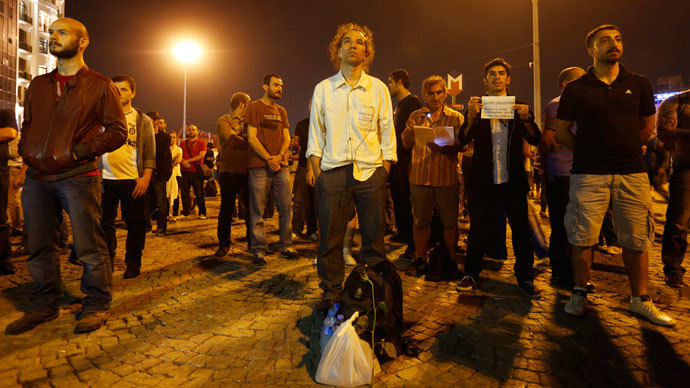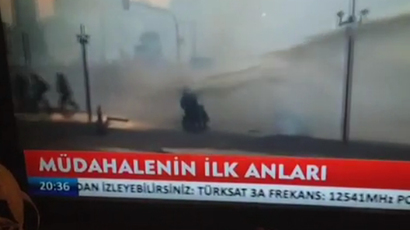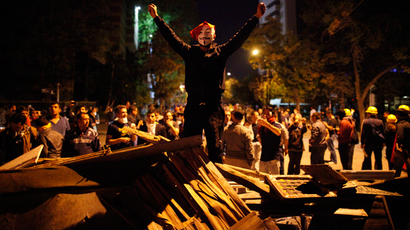#Duranadam: 'Standing man' protest goes viral as Turkey eyes law to restrict social media

The Turkish government is mulling a draft law that aims to crack down on those who post "provocative material" on social media. Meanwhile, a new form of protest is sweeping Turkey, taking Twitter by storm under the hashtag ‘standing man.’
Turkish Interior Minister Muammer Guler said on Monday that the
government was drafting a law to restrict social media content.
Guler said the measures were being discussed in response to the
influx of “provocative material” that has appeared on
social media. The new law will grant the government powers to
investigate and prosecute individuals who publish offending
material.
The Turkish state department has already begun to examine around
5 million tweets about the Gezi Park protests, Turkish news
outlet Hurriyet reported.
The minister claims that some of the material published by
activists is false and is being manipulated to incite further
protests. He previously posted on his Twitter feed a photo used
by the protesters showing a man with several plastic bullet
wounds on his chest with the accompanying caption, “Fascist
dictator's police did this to a protester with plastic
bullets."
Guler alleged that the image was actually from an Arab Spring
uprising, and had nothing to do with the nationwide protests that
have gripped Turket for the last two weeks.
“We have a study on those who provoke the public via
manipulations with false news and lead them to actions that would
threaten the security of life and property by using Twitter,
Facebook or other tools of the social media,” Guler said,
adding that citizens must not be allowed to carry out a “witch
hunt” over Twitter.

The standing man
As the Turkish government moves towards a crackdown on social
media, a new trend took Turkish-language Twitter by storm on
Tuesday.
An artist’s unorthodox protest has captured the minds of
demonstrators in Istanbul. Erdem Gunduz stood silently for eight
hours straight in front of a portrait of the founder of modern
Turkey, Kemal Ataturk, after Taksim Square was reopened on
Monday.
Hundreds joined the silent protester before police arrived and
arrested those who refused to disperse. Copycat protests then
cropped up across the country on Monday night in emulation of
Gunduz.
On Tuesday morning, the hashtag duranadam’ ("standing man" in
Turkish) exploded onto Twitter’s top trends.
Turkey’s anti-government protest movement has gathered
significant momentum over the past two weeks. The unrest
initially started out as a protest against the redevelopment of
Gezi Park, located in Istanbul’s central Taksim Square. Reports
of police brutality and the heavy-handed tactics employed to
disperse activists acted as a catalyst, drawing more public
support.
Accusations have since been leveled at Prime Minister Erdogan’s
government, with critics slamming his “authoritarian”
approach to government and his imposition of conservative Muslim
values on a secular society.
The government has adopted a zero-tolerance attitude towards
protests, decrying them as illegal and driven by terrorists. The
government intimated on Monday that the army could be brought in
to bring the protesters to heel.
















